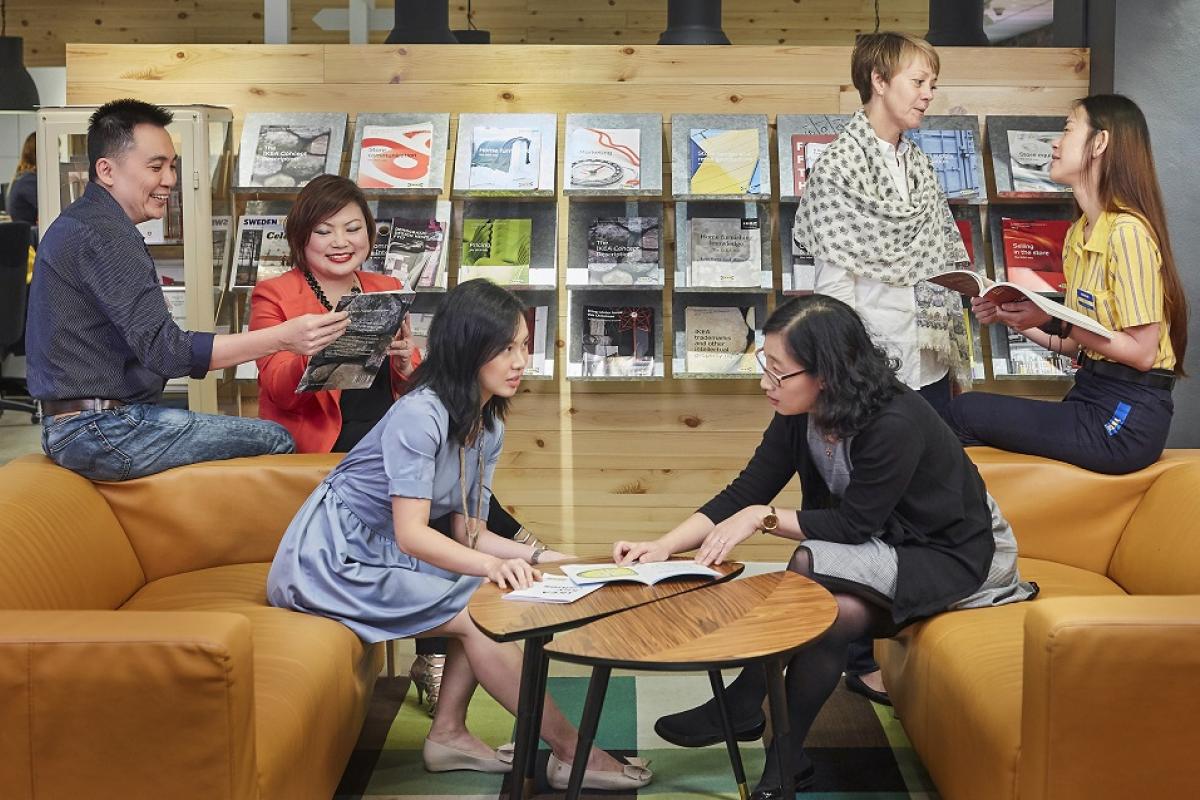Unpacking Ikea’s very Swedish workplace culture
- Kelvin Ong

Sitting down at Ikea Singapore’s welcome lobby (which looks into the rest of the office) with Lydia Song, HR Director; and Gloria Ngooi, Head of Rewards, Ikea Southeast Asia, the Swedish home product retailer’s relaxed and inviting office vibe is clear from the start.
As it should be. After all, the world’s largest furniture line is known as a “brand for everyone”, because of its affordable and accessible, ready-to-assemble home living products.
This “casual and open” workplace culture, as Song puts it, has always been there, but was accentuated further in 2016. That’s when the company “refreshed, rephrased and modernised” its corporate values.
Today, any scheme or initiative that the company introduces – those for internal stakeholders included – is based on those values, which are to: Develop the business and deliver results; Lead and develop people; Inspire and clarify; Relate togetherness; Find better ways; and Enable change.
This sort of candid culture, alongside the updated values, has led to some key actions being undertaken by the HR team over the last two years. These have come in the areas of compensation and benefits, career development, performance management, and training.
At a glance
Number Of Employees (Southeast Asia): 2,600
Size of HR Team: 64
Key HR Focus Areas:
· Learning and development
· Recruitment
· Talent management
· Compensation and benefits
Dual performance management
One good example, says Song, is the newly-implemented monthly one-on-one conversations between line managers and team members. In these discussions, the team leads cover their direct report’s contribution to the business in the past year, what has been achieved, upcoming career steps, and how they see their own development.
“So it’s not only business-related, but also about personal development,” says Song. The most important thing, she adds, is that staff can talk freely about their job aspirations and plans.
These monthly talks then culminate in an end-of-year performance evaluation and development discussion, during which clear goals and action plans for the coming year are discussed.
Head of Rewards Ngooi says what is unique about Ikea’s performance management and review approach is that it focuses heavily on each person’s unique growth and development.
“For many organisations out there, at the end of the year when they have a performance evaluation, they’re talking about only performance, which is a very tense process,” she explains.
“But for us, we split it into two parts. The evaluation portion has to happen, but the other focus is on our people’s development.
“We believe that each individual should take ownership of their own development as well, and this is something we tell our co-workers a lot.”
This dual format is critical because it gives staff the space – and ample opportunity – to have frank discussions about their job aspirations and plans with managers.
“They can talk to their managers about whether they want to move laterally, move overseas, or take on a role in the store or service (corporate) office next,” says Ngooi.

Building a leadership pipeline
Closely related to the performance evaluation and development process is Ikea’s unique approach to leadership development, which is in line with a global HR philosophy that demands Ikea “give down-to-earth, straightforward people the possibility to grow”.
Through its management competence review, the Southeast Asia HR team will map out succession plans for key positions across all departments and business units.
During this process, HR will consult the respective team managers on their succession outlook. Managers will determine how many successors they will require to be ready in the coming years, and what kind of training and development is needed for those identified.
Although this top-down, bottom-up approach has been in place for at least six years, Song says a lot of improvements have been made since 2016 in particular. These last two years have seen the level of commitment of managers to the overall planning process grow significantly.
As a result, in 2016, there were over 100 promotions across the region, with some 59% of key positions also identified for successorship within the next one to three years.
The organisation has also introduced a mentorship initiative in recent years. Every senior team member or identified key successor will be assigned a mentor from the senior management team. In 2017, 35 mentors were paired with 75 mentees.
“The idea is that senior management is also connected to the frontline of the business and can develop potentials there,” says Song, who herself has three mentees.
Benjawon Omark, the store manager of Ikea Bang Na in Thailand, and Edward Ong, the head of land acquisition and market analysis for Southeast Asia, have both benefitted from this keen focus on leadership development.
Omark first joined Ikea as a Thai translator less than seven years ago, and today, she oversees the operations of the Bang Na outlet.
Ong initially took on the role of a management trainee within Ikea’s Singapore operations. He then moved to the internal communications department, before finally joining the market analysis and land acquisition team, which he now leads. This is a very senior role, which sees him talking to joint venture partners, and choosing sites for new Ikea operations.
Fair and family-friendly
As an employer with roots in such a progressive society as Sweden, Ikea prides itself on treating each and every staff member equally. This mindset is particularly evident in its work-life policies.
In September last year, the company rolled out a new paid paternity leave scheme, in which all male employees across Southeast Asia have access to one month of leave. This is up from the previous offering of one week paid paternity leave and is now uniform across the region, even in countries where there is no government mandate for paternity leave.
Some 27 employees availed of the new entitlement in the same week it was introduced.
“It’s a small step that makes a big difference to the dads in our business, and their partners,” says Song.
But the company has always been a trailblazer when it comes to fair and pro-family compensation and benefits.
For instance, in 2013, standard working hours were reduced from 44 hours per week to 42.5 hours across the board, for both office and store workers – a move still largely unheard of in the retail sector.
To help store workers further balance the competing demands of the business and their families, the company also enables flexible scheduling. Because the roster is given four weeks ahead of time, it is particularly convenient for students and parents to plan their days in advance effectively.
“Most of our colleagues are on the frontlines and retail-based. Unfortunately, their physical presence is required, so we are still limited by that,” says Ngooi.
“But I believe we have very fair policies and terms. Whatever scheme we introduce is the same for all service office and store workers.”
Finger on the pulse
All these changes have proven to be extremely beneficial for the employee experience, as evidenced by the results of Ikea’s annual employee surveys.
An engagement survey called the Voice Index, which both Song and Ngooi refer to several times throughout the interview, has revealed that the company is striking a sweeter chord than ever with staff.
The Voice Index measures employees’ views on everything about the organisation – including how happy they are working there and how empowered they are in their day-to-day jobs.
The index also has a leadership component, which poses questions based on the company’s six values. Staff are asked about how effective their managers are at exemplifying those ideals.
Song says the purpose of the survey is not to penalise leaders, but rather to find out the potential of people and the organisation as a whole.
“This is a way for us to listen to the real employee voices. Otherwise, people will not feel like we are sincere about getting their feedback.”
The Southeast Asia offices started measuring employee engagement in 2010, recording a score of 509 points. This grew to 692 in 2014, before reaching a high count of 758. This puts the region in the “excellent” category, and one of the top divisions for engagement among Ikea regions globally.
Song says this all means a majority of employees are feeling positive towards the organisation, adding that higher Voice scores have also been shown to lead to greater bottom lines.
“Our store managers take great pride when we have high scores. It keeps each business unit on their toes and on track to ensuring that they are following up on their business plans,” she says.
One of HRM Magazine’s cornerstones, the monthly HR Insider spread is an in-depth feature exploring the people management teams of some of the region’s most prolific organisations.






